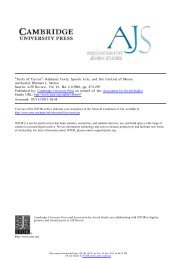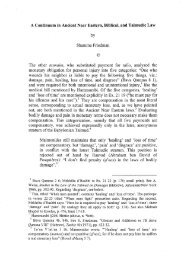Torah in the Mouth.pdf
Torah in the Mouth.pdf
Torah in the Mouth.pdf
You also want an ePaper? Increase the reach of your titles
YUMPU automatically turns print PDFs into web optimized ePapers that Google loves.
<strong>Torah</strong> <strong>in</strong> <strong>the</strong> <strong>Mouth</strong>, Writ<strong>in</strong>g and Oral Tradition <strong>in</strong> Palest<strong>in</strong>ian Judaism, 200 BCE - 400 CE<br />
Jaffee, Mart<strong>in</strong> S., Samuel and Al<strong>the</strong>a Stroum Professor of Jewish Studies, University of Wash<strong>in</strong>gton<br />
Pr<strong>in</strong>t publication date: 2001, Published to Oxford Scholarship Onl<strong>in</strong>e: November 2003<br />
Pr<strong>in</strong>t ISBN-13: 978-0-19-514067-5, doi:10.1093/0195140672.001.0001<br />
of Q's testimony about <strong>the</strong> Pharisees is overcome by a plethora of overlapp<strong>in</strong>g and, at times, compet<strong>in</strong>g representations of <strong>the</strong> Pharisees<br />
as be<strong>in</strong>g among <strong>the</strong> most persistent antagonists of Jesus' person and message. The full range of images has been <strong>the</strong> subject of frequent<br />
discussion and will not deta<strong>in</strong> us here. From <strong>the</strong> perspective of our <strong>in</strong>terest <strong>in</strong> <strong>the</strong> nature of Pharisaic tradition, however, one particular<br />
passage, paralleled <strong>in</strong> Mat. 15:1–20 and Mark 7:1–23, is of s<strong>in</strong>gular importance.<br />
The unit beg<strong>in</strong>s with Jesus' criticism of <strong>the</strong> preoccupation of scribes and Pharisees with hand-wash<strong>in</strong>g before meals (Mat. 15:1–2/Mark 7:1<br />
–5), a <strong>the</strong>me explored as well <strong>in</strong> <strong>the</strong> Q materials underly<strong>in</strong>g Mat. 23 and Luke 11 (see above). In <strong>the</strong> present sett<strong>in</strong>g, Jesus goes on to a<br />
broader charge, rem<strong>in</strong>iscent of Paul's statements <strong>in</strong> Gal. 1:14, that Pharisaic practices <strong>in</strong> general replace div<strong>in</strong>e commandments with<br />
human conventions (Mat. 15:3–9/Mark 7:6–13). He concludes by redef<strong>in</strong><strong>in</strong>g defilement as that which is found <strong>in</strong> <strong>the</strong> human heart ra<strong>the</strong>r<br />
than absorbed from material agents such as food (Mat. 15:10–20/Mark 7:14–23). The parallel versions differ slightly <strong>in</strong> <strong>the</strong> sequence of<br />
logia and <strong>the</strong>ir precise formulation. Each pericope, moreover, has its own emphasis, conta<strong>in</strong><strong>in</strong>g material not found <strong>in</strong> its companion. S<strong>in</strong>ce<br />
<strong>the</strong> Markan version focuses more squarely on our own <strong>in</strong>terests here, we will use it as <strong>the</strong> basis of this discussion.<br />
The most relevant portion extends from Mark 7:1–13 (Mat. 15:1–9):<br />
1. (7:1–2) Now when <strong>the</strong> Pharisees ga<strong>the</strong>red toge<strong>the</strong>r to him, with some of <strong>the</strong> scribes, who had come from Jerusalem,/ <strong>the</strong>y saw that<br />
end p.47<br />
some of his disciples ate with hands defiled, that is, unwashed.<br />
2. (7:3–4) For <strong>the</strong> Pharisees, and all <strong>the</strong> Jews, do not eat unless <strong>the</strong>y wash <strong>the</strong>ir hands, observ<strong>in</strong>g <strong>the</strong> tradition of <strong>the</strong> elders [parados<strong>in</strong><br />
ton presbuteron]; and when <strong>the</strong>y come from <strong>the</strong> market place, <strong>the</strong>y do not eat unless <strong>the</strong>y purify <strong>the</strong>mselves; and <strong>the</strong>re are many o<strong>the</strong>r<br />
traditions [parelabon] that <strong>the</strong>y observe, <strong>the</strong> wash<strong>in</strong>g of cups and pots and vessels of bronze.<br />
3. (7:5) And <strong>the</strong> Pharisees and <strong>the</strong> scribes asked him, “Why do your disciples not live [peripatous<strong>in</strong>] accord<strong>in</strong>g to <strong>the</strong> tradition of <strong>the</strong><br />
elders, but eat with hands defiled?”<br />
(7:6–8) And he said to <strong>the</strong>m, “Well did Isaiah prophesy of you hypocrites as it is written (Is. 29:13):<br />
‘this people honors me with <strong>the</strong>ir lips, but <strong>the</strong>ir heart is far from me;/ <strong>in</strong> va<strong>in</strong> do <strong>the</strong>y worship me, teach<strong>in</strong>g as doctr<strong>in</strong>es <strong>the</strong> precepts of<br />
men’ [entalmata anthropon]/.<br />
You leave <strong>the</strong> commandment of God, and hold fast <strong>the</strong> tradition of men.”<br />
4. (7:9–13) And he said to <strong>the</strong>m, “You have a f<strong>in</strong>e way of reject<strong>in</strong>g <strong>the</strong> commandment [entelon] of God, <strong>in</strong> order to keep your tradition<br />
[parados<strong>in</strong>]! For Moses said, ‘Honor your fa<strong>the</strong>r and your mo<strong>the</strong>r [Ex. 20:12, Dt. 5:16]’; and ‘He who speaks evil of fa<strong>the</strong>r and mo<strong>the</strong>r,<br />
let him surely die [Ex. 21:16, Lev. 20:9]’; but you say, ‘If a man tells his fa<strong>the</strong>r or his mo<strong>the</strong>r, What you would have ga<strong>in</strong>ed from me is<br />
Corban (that is, given to God)—<strong>the</strong>n he is no longer permitted to do anyth<strong>in</strong>g for his fa<strong>the</strong>r or mo<strong>the</strong>r,’ thus mak<strong>in</strong>g void <strong>the</strong> word of<br />
God through your tradition [paradosei] which you hand on [paredokate]. And many such th<strong>in</strong>gs you do.”<br />
Sections 1 and 3 are an orig<strong>in</strong>al literary unity <strong>in</strong>to which 2 has been <strong>in</strong>terpolated as a paren<strong>the</strong>tic ethnographic guide to Pharisaic ritual<br />
practice. 24 Section 4 amplifies <strong>the</strong> conclud<strong>in</strong>g po<strong>in</strong>t of 3, that Pharisaic tradition contravenes <strong>the</strong> div<strong>in</strong>e will.<br />
Let us focus on key po<strong>in</strong>ts of <strong>in</strong>terest <strong>in</strong> sections 2–4 <strong>in</strong> sequence. As A. Baumgarten has observed, 2's key terms for tradition, parados<strong>in</strong><br />
and parebelon, correspond respectively to <strong>the</strong> acts of pass<strong>in</strong>g on and receiv<strong>in</strong>g someth<strong>in</strong>g from <strong>the</strong> past. These echo <strong>the</strong> Hebrew roots<br />
msr and qbl that play a key role <strong>in</strong> <strong>the</strong> later Mishnah's representation of <strong>the</strong> l<strong>in</strong>kage of rabb<strong>in</strong>ic tradition to Mosaic orig<strong>in</strong>s (M. Avot<br />
1:1ff.). 25 Mark here identifies hand-wash<strong>in</strong>g as an element of this larger tradition received from <strong>the</strong> ancestors. Later rabb<strong>in</strong>ic tradition also<br />
l<strong>in</strong>ks traditions about ritual hand-wash<strong>in</strong>g at mealtimes to <strong>the</strong> first-century disciples of Hillel and Shammai (M. Berakhot 8:2–3, T. Berakhot<br />
5:26–27). 26 So it is at least possible that—if this <strong>in</strong>terpolated passage stems from a late moment <strong>in</strong> <strong>the</strong> development of Mark's textual<br />
tradition—it might reflect term<strong>in</strong>ology for <strong>the</strong> transmission of tradition that was current <strong>in</strong> some Jewish circles <strong>in</strong> <strong>the</strong> latter portion of <strong>the</strong><br />
first century CE or after.<br />
The question, however, is whe<strong>the</strong>r <strong>in</strong> Mark's view this tradition is dist<strong>in</strong>ctive to <strong>the</strong> Pharisees. “All <strong>the</strong> Jews,” after all, follow this<br />
custom. 27 So it is not clear at this po<strong>in</strong>t that <strong>the</strong> Pharisaic challenge to Jesus' disciples is based on specifically Pharisaic custom or, to<br />
<strong>the</strong> contrary, accuses <strong>the</strong> disciples of ignor<strong>in</strong>g <strong>the</strong> traditions of Israel <strong>in</strong> general. 28 Section 3 resolves this matter. Jesus' ascription of Is.<br />
29:13's “people” (LXX: laos; MT: ‘m) to his Pharisaic opponents leaves no doubt that, <strong>in</strong> Mark's m<strong>in</strong>d, whe<strong>the</strong>r or not <strong>the</strong> Pharisees<br />
orig<strong>in</strong>ated <strong>the</strong> ritual of hand-wash<strong>in</strong>g, it is <strong>the</strong>ir tradition alone that has elevated a human convention to <strong>the</strong> level of a div<strong>in</strong>e commandment.<br />
The quotation from Scripture is a close paraphrase of <strong>the</strong> Septuag<strong>in</strong>t, which also contrasts div<strong>in</strong>ely orig<strong>in</strong>at<strong>in</strong>g didaskalias (“doctr<strong>in</strong>es”) with<br />
mere human “precepts” (entalmata: cf. MT: m wt ’nšym). It is impossible to know whe<strong>the</strong>r late first-century Pharisees claimed div<strong>in</strong>e<br />
orig<strong>in</strong>s for <strong>the</strong>ir customs, but it is clear that Mark understands <strong>the</strong>ir loyalty to <strong>the</strong>ir traditions as defiance of God's own commandments.<br />
Ano<strong>the</strong>r important element of section 3 is <strong>the</strong> very question posed by <strong>the</strong> Pharisees to Jesus. As is commonly po<strong>in</strong>ted out, <strong>the</strong> verb<br />
peripatous<strong>in</strong> is best rendered as “walk<strong>in</strong>g” or “conduct<strong>in</strong>g oneself,” <strong>in</strong> this case <strong>in</strong> accord with <strong>the</strong> tradition of <strong>the</strong> elders. It is likely that<br />
some form of <strong>the</strong> Hebrew root hlk underlies this expression. The reflexive form is well attested <strong>in</strong> <strong>the</strong> Hebrew Bible (e.g., Gen. 6:9, 17:1,<br />
PRINTED FROM OXFORD SCHOLARSHIP ONLINE (www.oxfordscholarship.com). (c) Copyright Oxford University Press, 2003 - 2011. All Rights Reserved.<br />
Under <strong>the</strong> terms of <strong>the</strong> licence agreement, an <strong>in</strong>dividual user may pr<strong>in</strong>t out a PDF of a s<strong>in</strong>gle chapter of a monograph <strong>in</strong> OSO for personal use (for details<br />
see http://www.oxfordscholarship.com/oso/public/privacy_policy.html).<br />
Subscriber: Columbia University; date: 20 September 2011

















